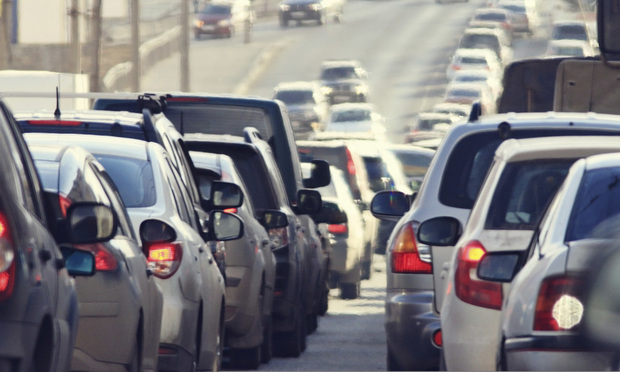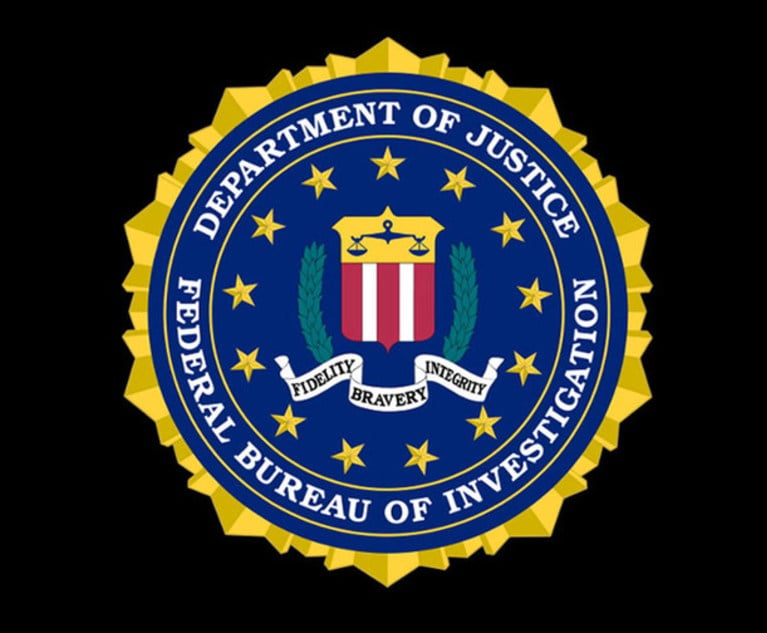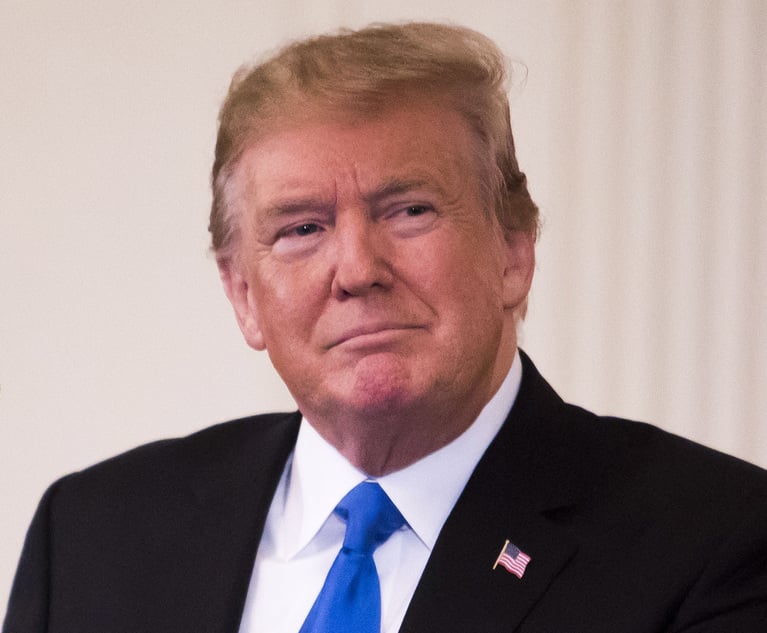NJ Joins California's Suit Over Trump's Emission Standards Rule
The complaint was filed one day after the administration officially implemented a rule stating that only the federal government could set emissions standards for cars.
September 20, 2019 at 01:38 PM
5 minute read
The original version of this story was published on The Recorder
 iStock
iStock
A lawsuit joined by more than two-dozen states and cities and led by California brings claims against the Trump administration over its repeal of stricter state emissions standards—the start of what is sure to be a drawn-out legal fight that could get to the U.S. Supreme Court.
In a lawsuit filed in District Court for the District of Columbia, the 24 attorneys general as well as the cities of New York and Los Angeles allege that the National Highway Traffic Safety Administration acted arbitrarily and capriciously in approving a rule that effectively revoked the state's standards and that officials didn't have the authority to make the change in the first place.
In addition to New Jersey, the other states include Pennsylvania, Connecticut, New York and Delaware. The suit was filed on Sept. 20, one day after the administration officially implemented a rule stating that only the federal government could set emissions standards for cars.
"During a time when the federal government has refused to take action to address the threat of climate change, it is up to the States to take the lead in the fight to preserve our environment,"New Jersey Gov. Phil Murphy said in a statement on the day of the filing.
Gurbir Grewal, the state's attorney general, added: "It is bad enough that the Administration has turned a blind eye to climate change, but now our federal government is trying to stop states like New Jersey from tackling this existential threat. For decades, states have regulated vehicle emissions to protect the health and safety of our residents, and federal law gives us the right to do so. Because we need these strong rules now more than ever, we're taking the Administration to court to stop them."
California, the lead plaintiff in the suit, has long set its own stricter standards through an EPA waiver granted under the Clear Air Act. Twelve other states and D.C. have adopted those guidelines, at least in part.
"Two courts have already upheld California's emissions standards, rejecting the argument the Trump administration resurrects to justify its misguided Preemption Rule. Yet, the administration insists on attacking the authority of California and other states to tackle air pollution and protect public health," California State Attorney General Xavier Becerra said in a statement announcing the lawsuit.
The lawsuit asks a judge to find the rule "unlawful and set aside because it exceeds NHTSA's authority, contravenes Congressional intent, and is arbitrary and capricious, and because NHTSA has failed to conduct the analysis required under the National Environmental Policy Act."
The complaint points to the California standards as "one of the most effective state policies to reduce greenhouse gases and other pollutant emissions from the transportation sector." It also notes that the federal government has allowed California to adopt the more rigid rules for decades and that federal courts have previously upheld the standards.
And it claims that Congress is the body that has oversight over whether the state can have the tighter emissions rules in place, not the NHTSA.
The suit further alleges that federal officials violated the Administrative Procedures Act in adopting the new regulation and that the agency "has failed to consider the damage the Preemption Regulation will inflict on the environment and public health and welfare" as required by federal law.
President Donald Trump announced the policy move in a tweet earlier this week while he was in California. He wrote that the federal government was revoking the state's waiver to implement the restrictions "in order to produce far less expensive cars for the consumer, while at the same time making the cars substantially SAFER."
"This will lead to more production because of this pricing and safety advantage, and also due to the fact that older, highly polluting cars, will be replaced by new, extremely environmentally friendly cars," he added.
California authorities cried foul and quickly promised the lawsuit after the rule was announced, arguing that the emissions rules are needed to better fight off pollution and climate change.
The White House reportedly has set its sights on getting the case up to the U.S. Supreme Court by the end of Trump's first term in office, at the start of 2021.
It's unclear if such a timeline is possible, or whether the justices would even agree to take up the case. But a ruling from the high court would likely set a precedent on whether states can set their own emissions guidelines, or if the federal government has the final say on the matter.
Shortly after the lawsuit was filed, House Judiciary Committee Chairman Jerrold Nadler and committee member Rep. David Cicilline announced they are investigating potential "abuses of power" by Trump after the Justice Department reportedly launched an antitrust probe into four automakers that signed onto the California emissions standards.
"As we have previously made clear, any political abuse of the Department's antitrust enforcement power is unacceptable. Antitrust enforcement must be conducted in accordance with the rule of law, never wielded as a political weapon to retaliate against perceived political enemies of the President," they wrote in a letter to White House counsel Pat Cippolone and Assistant Attorney General Makan Delrahim, who leads DOJ's antitrust division.
"This is particularly shocking where it appears that a state representing approximately 40 million people and a set of important individual companies are being targeted for simply participating in the political process."
This content has been archived. It is available through our partners, LexisNexis® and Bloomberg Law.
To view this content, please continue to their sites.
Not a Lexis Subscriber?
Subscribe Now
Not a Bloomberg Law Subscriber?
Subscribe Now
NOT FOR REPRINT
© 2025 ALM Global, LLC, All Rights Reserved. Request academic re-use from www.copyright.com. All other uses, submit a request to [email protected]. For more information visit Asset & Logo Licensing.
You Might Like
View All
3rd Circuit Strikes Down NLRB’s Monetary Remedies for Fired Starbucks Workers


As Trafficking, Hate Crimes Rise in NJ, State's Federal Delegation Must Weigh in On New UN Proposal
4 minute read
Trending Stories
- 1'It's Not Going to Be Pretty': PayPal, Capital One Face Novel Class Actions Over 'Poaching' Commissions Owed Influencers
- 211th Circuit Rejects Trump's Emergency Request as DOJ Prepares to Release Special Counsel's Final Report
- 3Supreme Court Takes Up Challenge to ACA Task Force
- 4'Tragedy of Unspeakable Proportions:' Could Edison, DWP, Face Lawsuits Over LA Wildfires?
- 5Meta Pulls Plug on DEI Programs
Who Got The Work
Michael G. Bongiorno, Andrew Scott Dulberg and Elizabeth E. Driscoll from Wilmer Cutler Pickering Hale and Dorr have stepped in to represent Symbotic Inc., an A.I.-enabled technology platform that focuses on increasing supply chain efficiency, and other defendants in a pending shareholder derivative lawsuit. The case, filed Oct. 2 in Massachusetts District Court by the Brown Law Firm on behalf of Stephen Austen, accuses certain officers and directors of misleading investors in regard to Symbotic's potential for margin growth by failing to disclose that the company was not equipped to timely deploy its systems or manage expenses through project delays. The case, assigned to U.S. District Judge Nathaniel M. Gorton, is 1:24-cv-12522, Austen v. Cohen et al.
Who Got The Work
Edmund Polubinski and Marie Killmond of Davis Polk & Wardwell have entered appearances for data platform software development company MongoDB and other defendants in a pending shareholder derivative lawsuit. The action, filed Oct. 7 in New York Southern District Court by the Brown Law Firm, accuses the company's directors and/or officers of falsely expressing confidence in the company’s restructuring of its sales incentive plan and downplaying the severity of decreases in its upfront commitments. The case is 1:24-cv-07594, Roy v. Ittycheria et al.
Who Got The Work
Amy O. Bruchs and Kurt F. Ellison of Michael Best & Friedrich have entered appearances for Epic Systems Corp. in a pending employment discrimination lawsuit. The suit was filed Sept. 7 in Wisconsin Western District Court by Levine Eisberner LLC and Siri & Glimstad on behalf of a project manager who claims that he was wrongfully terminated after applying for a religious exemption to the defendant's COVID-19 vaccine mandate. The case, assigned to U.S. Magistrate Judge Anita Marie Boor, is 3:24-cv-00630, Secker, Nathan v. Epic Systems Corporation.
Who Got The Work
David X. Sullivan, Thomas J. Finn and Gregory A. Hall from McCarter & English have entered appearances for Sunrun Installation Services in a pending civil rights lawsuit. The complaint was filed Sept. 4 in Connecticut District Court by attorney Robert M. Berke on behalf of former employee George Edward Steins, who was arrested and charged with employing an unregistered home improvement salesperson. The complaint alleges that had Sunrun informed the Connecticut Department of Consumer Protection that the plaintiff's employment had ended in 2017 and that he no longer held Sunrun's home improvement contractor license, he would not have been hit with charges, which were dismissed in May 2024. The case, assigned to U.S. District Judge Jeffrey A. Meyer, is 3:24-cv-01423, Steins v. Sunrun, Inc. et al.
Who Got The Work
Greenberg Traurig shareholder Joshua L. Raskin has entered an appearance for boohoo.com UK Ltd. in a pending patent infringement lawsuit. The suit, filed Sept. 3 in Texas Eastern District Court by Rozier Hardt McDonough on behalf of Alto Dynamics, asserts five patents related to an online shopping platform. The case, assigned to U.S. District Judge Rodney Gilstrap, is 2:24-cv-00719, Alto Dynamics, LLC v. boohoo.com UK Limited.
Featured Firms
Law Offices of Gary Martin Hays & Associates, P.C.
(470) 294-1674
Law Offices of Mark E. Salomone
(857) 444-6468
Smith & Hassler
(713) 739-1250






